HALAAL REVOLUTION
A food culture way beyond bobotie and biryani
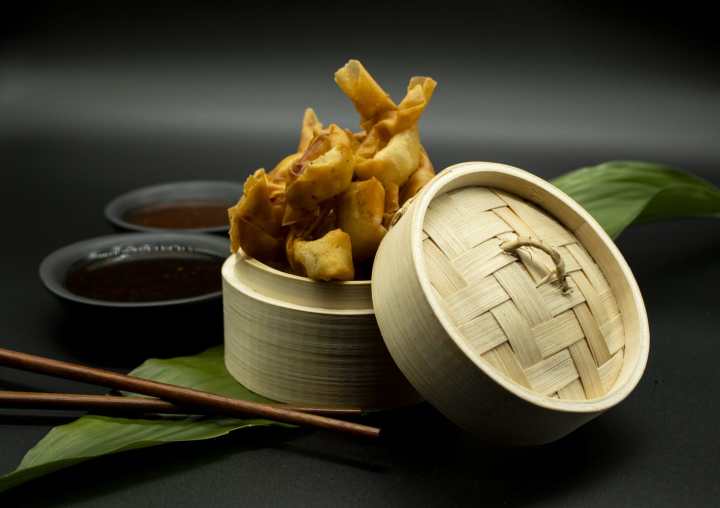
Halaal used to be the ‘special request’ meal that your Muslim colleague received after everyone else had already tucked in. Now, it’s the main meal that everyone can eat.
South Africa’s halaal food scene has largely reflected the country’s Muslim communities, and has been dominated by Malay and Indo-Pak influences. However, in the past decade a new generation of Muslim consumers – who came of age as apartheid ended and the world opened up to South Africa – have taken halaal food beyond chicken tikka in Fordsburg, biryani in Overport or bobotie in Bo-Kaap.
Today, halaal runs the gamut of hot food markets, cool burger joints, and even fine dining. The delights available to the halaal customer now range from spanakopitas to panini, sushi, dosas, espetada, knafeh and pain au chocolat, in fact, almost anything from wagyu and lobster to boerie rolls. And the customer base in some cases isn’t even entirely Muslim.
It’s been a long journey. Multiracial education; expanded travel and work opportunities; the demise of the Group Areas Act; wider perceptions of what constitutes “acceptable” careers for Muslims; new waves of immigrants from Africa, the Middle East and Asia, and the emergence of the social media global village have fuelled a halaal food revolution in South Africa.
Understanding halaal – what is forbidden?
The Arabic word halaal means permissible according to shariah (Islamic law) as set out in the Qu’ran. When it comes to food, the rules are pretty simple. Muslims are not allowed to consume pig meat or any pork products (including gelatine and shortenings). We can’t eat birds that have talons or carnivores with fangs. Crocodiles and sharks are also out, as is food containing blood, alcohol and other intoxicants.
The only grey area is around the permissibility of shellfish and non-fish like squid, octopus and mussels. Some scholars allow it, some don’t. But non-fish items and shellfish – especially prawns – are consumed by most Muslims in South Africa.
So what can Muslims eat?
Fish, fruit and vegetables can be eaten, as well as grain products like rice, pasta and bread. The list of permissible meat is generous: cows, sheep, lamb, chicken, hens, turkey, duck, camels, goats, geese, ostrich, etc – as long as they have been slaughtered in the halaal way.
Animals must be alive and healthy at the time of slaughter. The slaughter involves a swift cut to the jugular vein, carotid artery and windpipe. This is regarded as the most humane death for the animal, since its brain is deprived of blood and it loses consciousness almost immediately, feeling minimal pain. All blood must be drained from the carcass completely to separate it from impurities and prevent pathogens. During the slaughter, a simple prayer to God consisting of “In the name of Allah, Allah is the greatest” must be recited. That’s it.
Anything originating from an animal that hasn’t been slaughtered in this manner can’t be consumed by Muslims and is haraam (prohibited).
Halaal food, however, isn’t just about halaal meat. Serving a potential contaminant, like alcohol for instance, in a restaurant that serves halaal meals would negate the establishment’s halaal status. All the ingredients used to prepare the meal must also be reviewed for permissibility, so ideally suppliers must also be approved as halaal by a certifying authority. While this may sound daunting, it isn’t as complicated as you may think.
The simplicity of the halaal slaughter process has led to most major abattoirs and poultry farms in South Africa adopting this method of slaughter and becoming halaal-certified. This makes halaal meat and poultry widely available. Halaal certification has expanded into other food areas and about 90% of products on our supermarket shelves now bear a halaal stamp.
This accessibility of halaal meat and ingredients is a major reason for the growth and diversity of South Africa’s halaal food scene.
Get to the HalaalGoods Market next weekend
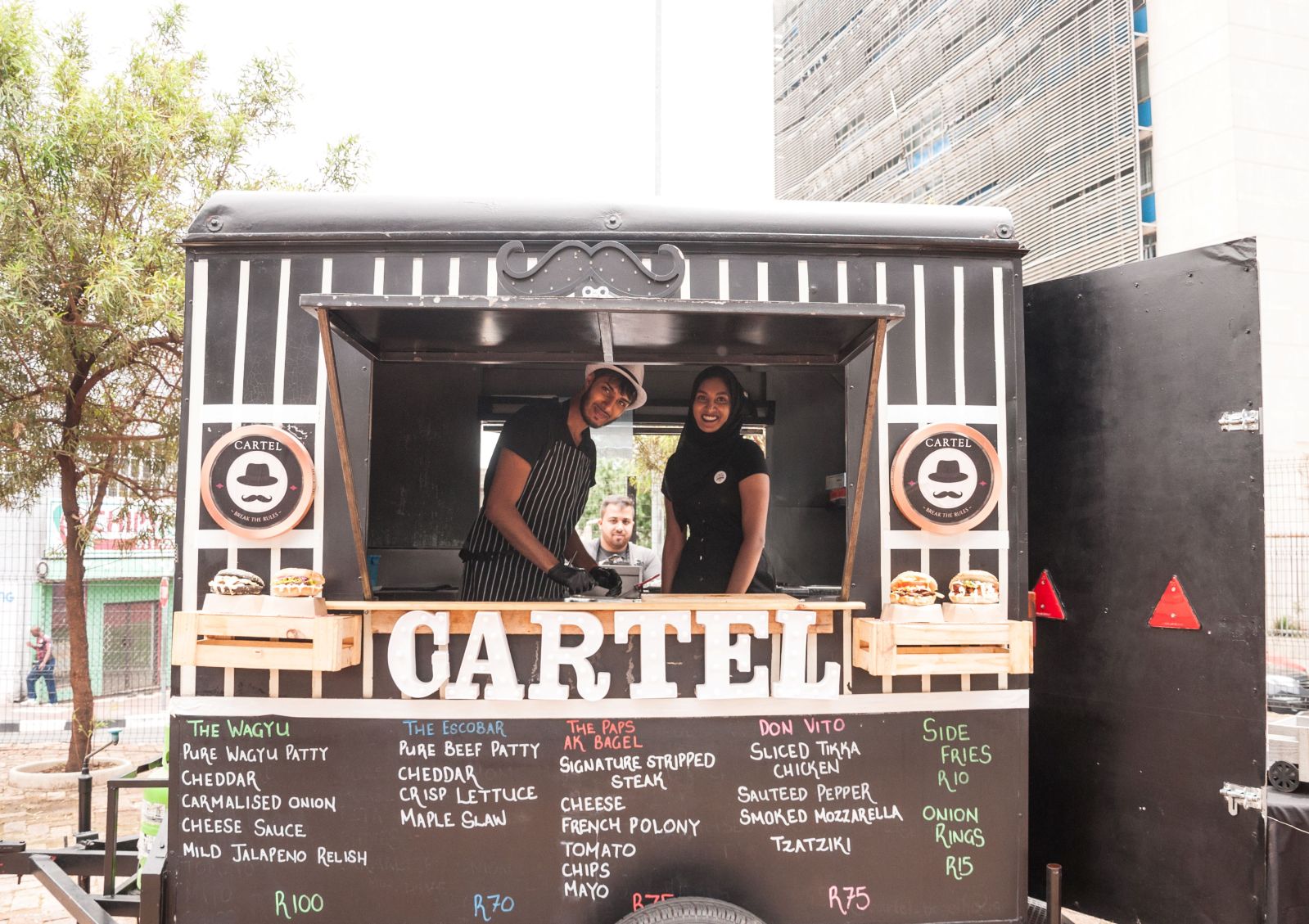
From wagyu to boerie rolls, HGM’s vendors cover all tastes and budgets. (Photo: HalaalGoods Market)
“I wish I had this variety of food to choose from when I was visiting artisanal markets years ago,” laments Fehmida Jordaan momentarily. But, Fehmz (as she’s popularly known) buzzes again as she shows me the list of vendors at the upcoming HalaalGoods Market (HGM) that runs from 30 September to 1 October at the Fox Street precinct in the Johannesburg CBD.
HGM is Fehmz’s brainchild.
“I was a regular at Neighbourgoods and Kamers [Kamers/Makers] in Joburg; and the I Heart Market and Morning Trade in Durban,” says Fehmz. The 43-year old livewire loved the energy of the artisans, and marvelled at the diversity of global street-food on display. Then she would circle back to the only halaal food options: samoosas or chicken tikka. Back then, pickings were slim when it came to halaal.
Fehmz knew what the ideal halaal artisanal market should look like and in 2016 HGM was born, selling hand-crafted, locally made food and goods suitable for Muslim consumers. Since then, its food vendors have taken visitors on a globe-trotting journey through dim sum, Turkish pides, American corndogs, Spanish paella, Syrian baklava and French macarons. Korean and Kenyan food will debut this year. HGM has also catered for all budgets: from wagyu and lobster to slap chips and boerie rolls.
The diversity of cuisines and food available at HGM also reflects the major shifts and evolution of the halaal food landscape in South Africa – especially over the past decade.
Serving up halaal in a digital environment
“Muslim millennials and Generation Xers are not shy to demand halaal food,” says Dilshad Parker. With a creative background as a graphic designer in the corporate world, she now runs Hungry for Halaal, a website that helps South Africans find information and reviews about halaal restaurants, travel, services and products in the country. Parker has been writing about the halaal industry for more than a decade. The knowledge and expertise gained has allowed her to build a business in a niche space around understanding the halaal market and how to serve up information to it in a digital environment.
“There is a lot more choice and variety. You can find halaal eateries in every province, from big cities to the far-flung dorpies. The halaal food scene also doesn’t miss a beat and has managed to keep up with food trends such as clean eating, vegan and plant-based food,” explains Parker.
Halaal fine dining
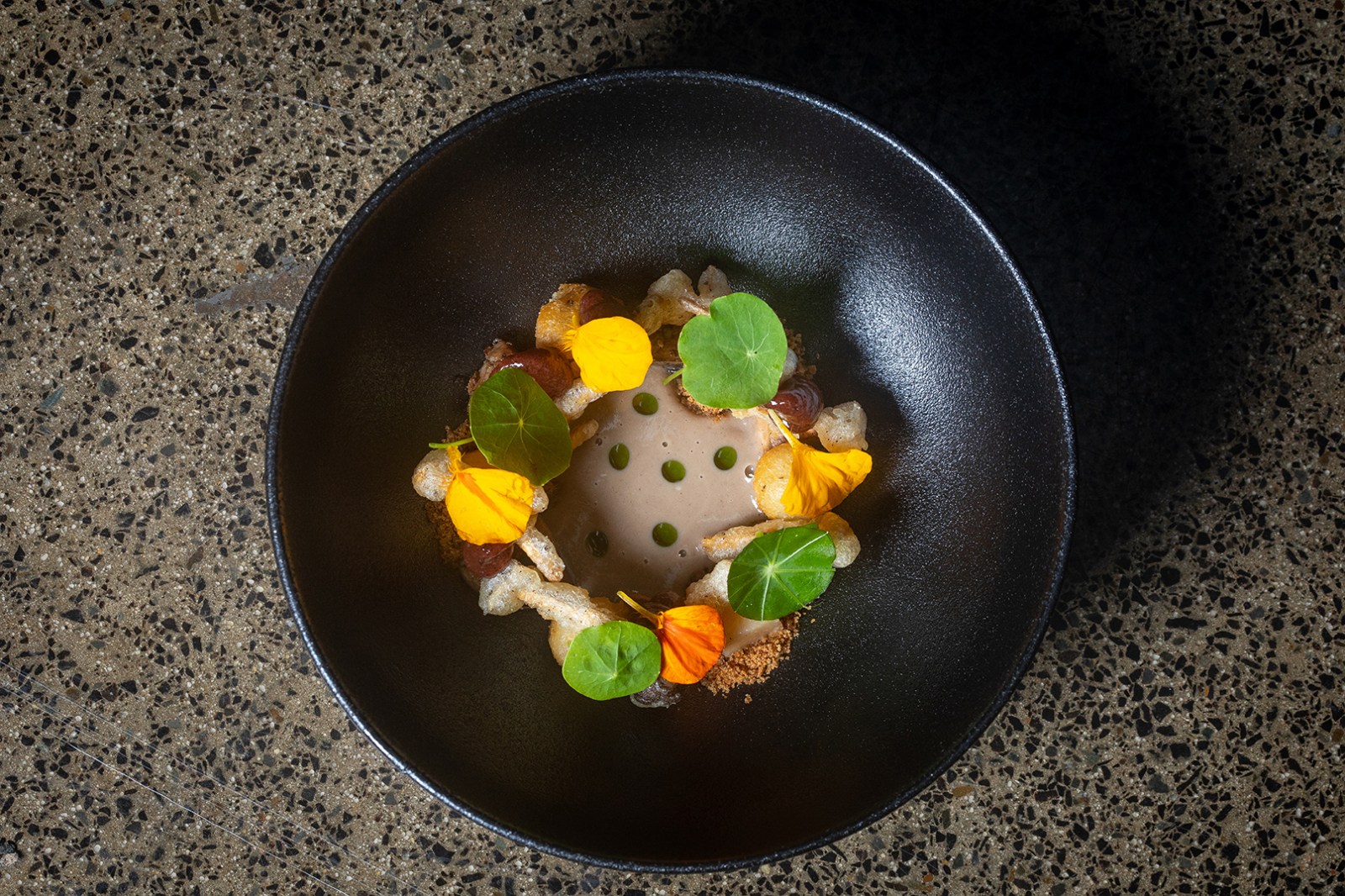
Halaal and fine dining: Chef Anwar Abdullatief’s seasoned foraged chestnut and mushroom velouté, aromatic poached quince, chestnut pomme dauphines, chestnut crumble, dehydrated and tempura shimeji, chicken of the woods, sour fig ‘konfyt’ gel, nasturtium oil. (Photo: The Happy Uncles)
Fine dining and halaal don’t usually go together. But at The Happy Uncles in Cape Town the authentic fine-dining experience is expressed in fully halaal form. Forty-year-old chef Anwar Abdullatief has already achieved executive chef status and cut his culinary teeth at Cavalli, Jordan, Siba Restaurant, Rupert & Rothschild and Clos Malverne. Covid forced him to reassess his goals, and The Happy Uncles opened in mid-2022.
Abdullatief offers chef’s tasting menus of four, six or eight courses, complete with the aesthetics and theatrics associated with traditional fine dining – but without pork, alcohol or any prohibited items. Guests savour salmon tartare with crème fraiché and wakami tempura curly kale with wild mushroom, avocado mousse and a sweet sour dressing; west coast squid with dune spinach and smoked mussel velouté; aged beef sirloin with spiced bone marrow. Each menu includes a canapé and palate cleanser.
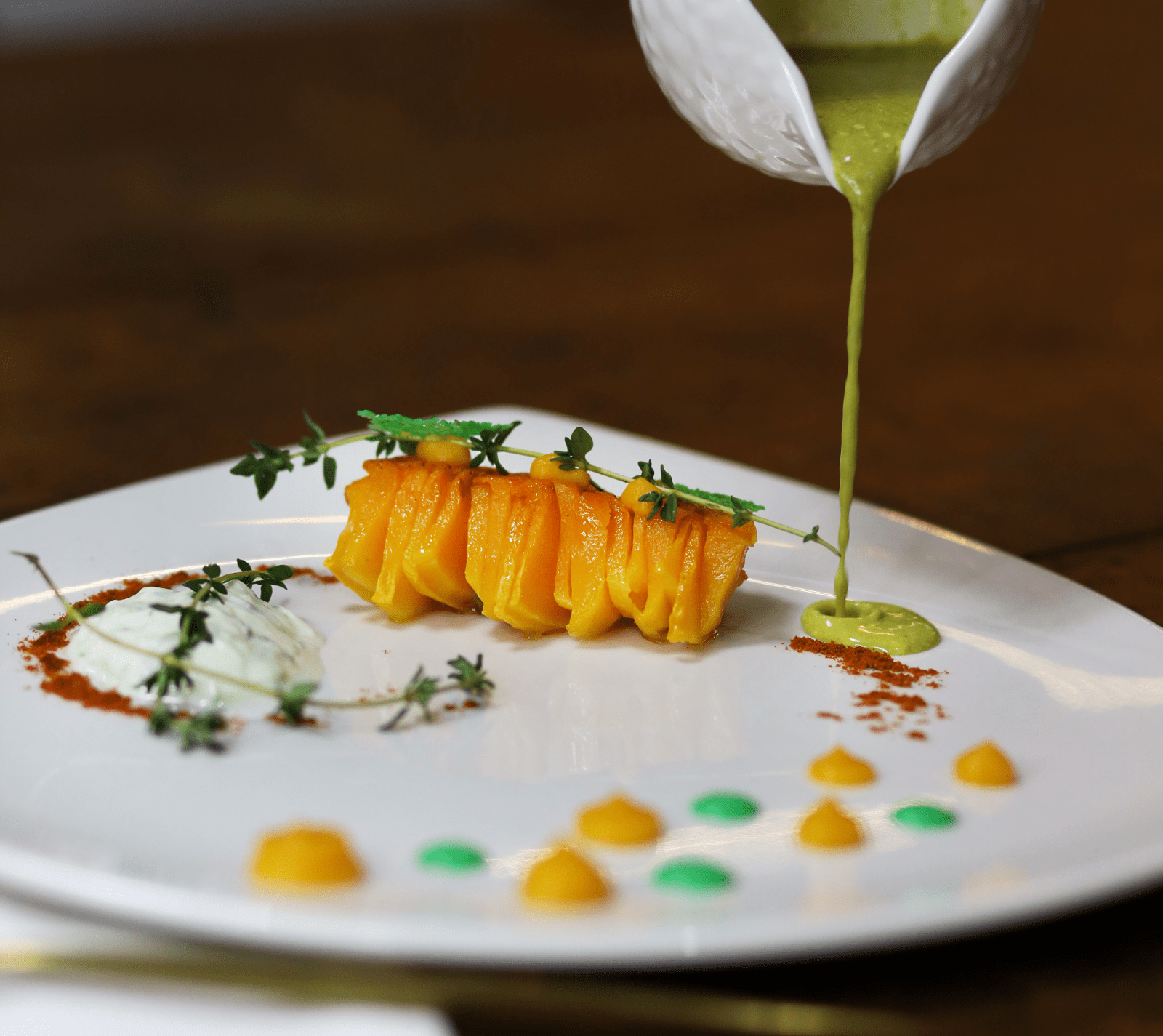
Modern halaal: Oven-roasted spiced butternut slices served with a mint and coriander cream sauce and carrot purée by Naadir Gattoo at Jasmine Fusion. (Photo: Waseem Kooreyshi)
In Johannesburg, chef Naadir Gattoo has been pushing the fine dining envelope and innovating since 2018 when he opened Jasmine Fusion in Sandton. A biokineticist by training, Gattoo has introduced date nights with a four-course chef’s menu, couples cooking classes and interactive dinners. White truffle reductions, wasabi mash and poached pear salad also feature on the high-end menu.
Time to mainstream halaal?
“Jasmine Fusion isn’t a halaal fine-dining restaurant, it’s fine dining that happens to be halaal,” says Gattoo. Abdullatief agrees since half his clientele isn’t even Muslim. Both chefs are confident that the quality of the food experience that they offer generously compensates for the absence of alcohol.
If that’s the case, then isn’t it about time that non-alcohol restaurants are included for judging in mainstream food awards like Eat Out?
In 2022, two South African halaal eateries were acknowledged for their culinary excellence:
Durban-based smashburger outlet, Smokin’ Joe’s, was voted as having the 12th-best burgers in the world. The survey used criteria such as value for money, consistency (based on Google and critic reviews), innovation, atmosphere, location and accessibility. Smokin’ Joe’s has now expanded to Cape Town.
And The Kitchen of Oz was unanimously awarded the “Best Burger in Joburg” title by 947 FM. Established in 2017, the halaal food truck that began with a single gas stove has morphed into a sit-down restaurant and takeaway in Emmarentia.
Proudly South African, kasi-style
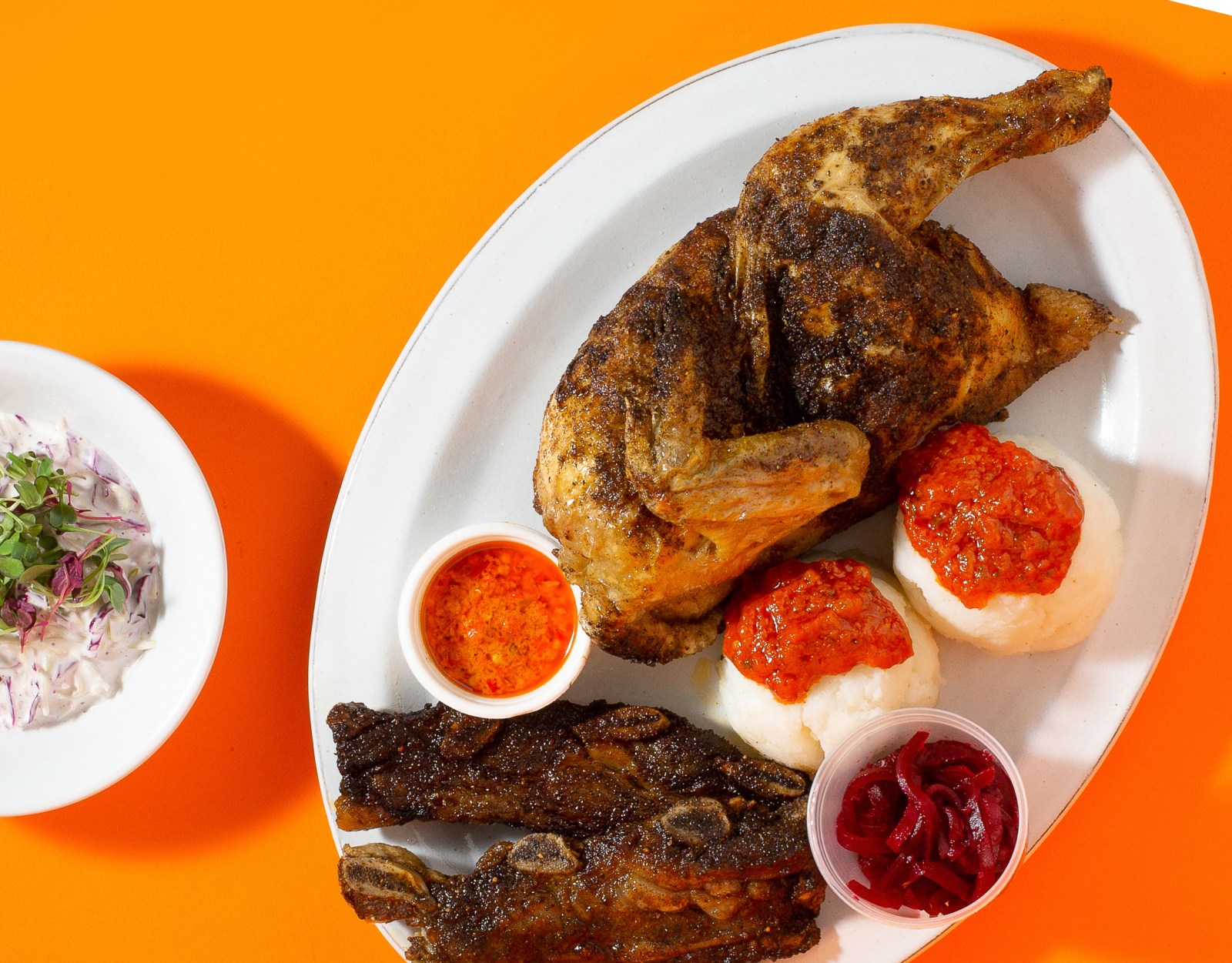
Gimba makes kasi-style food such as the popular ‘seven colours’ meals available in the Rosebank and Sandton areas through Uber Eats. (Photo: Gimba)
Ali Maphisa was frustrated by the limited halaal food available to him in Soweto, and decided to create it himself. Ten years ago, the then 34-year-old approached the South African National Zakah Fund (Sanzaf), an Islamic faith-based welfare and empowerment organisation, for funding. After attending Sanzaf’s basic business skills workshop, Maphisa received the funding, and Ali’s Kitchen was born.
Maphisa began by selling only kotas. His wife, Fatima, joined him in the kitchen and the menu expanded to include chicken dust, pap and ox liver, magwinyas, mangola, Russians, and fish and chips. As one of the only halaal kasi-style food joints in the area, Maphisa’s business is booming.
“There’s a major element missing if [Muslims] can’t consume their own country’s cuisine,” says Hamza Farooqui, CEO of the Millat Group, referring to the availability of halaal tshisa nyama. In September 2022, Millat launched Gimba – which means “greedy” in Mzansi slang – from the dark kitchens of Hyatt House in Sandton. Gimba serves similar fare to Ali’s Kitchen but makes township-style food available in the Rosebank and Sandton areas through Uber Eats. Farooqui is now working on taking Gimba to Cape Town.
Authentic and halaal
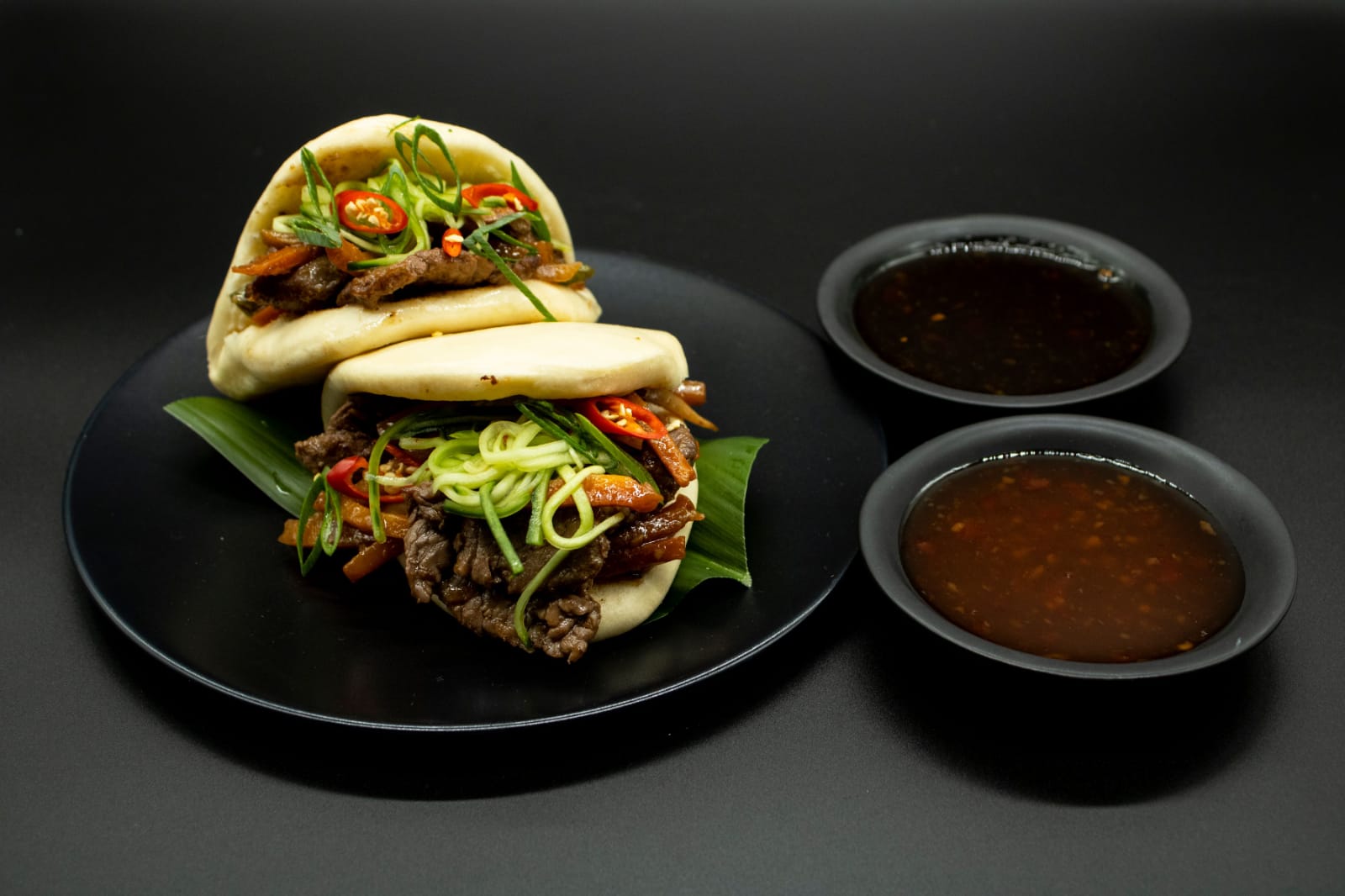
Gouwah Kaffoor needed an authentic Asian halaal food fix and established Buns & Bowls in Johannesburg. Her bao buns (pictured), potstickers and wontons have attracted a cult following. (Photo: Buns & Bowls)
Restrictions on the use of alcohol and pork products are challenging, but halaal food enthusiasts have largely managed to work around non-suitable ingredients to make their food halaal and remain authentic.
Gouwah Kaffoor trained and worked as a chef in Malaysia and Singapore, where halaal Asian food was plentiful. When the 45-year-old returned to South Africa, she saw a gap in the market and established Buns & Bowls in Johannesburg. Kafoor’s kung pao chicken, bao buns, pot stickers, wontons and bowls of yaki soba noodles have attracted a cult following in the city.
Kauser Azeem is passionate about Korean food, and through Borabox supplies halaal-conscious Joburgers with authentic Korean kimbap (sushi rolls), yangnyeom (fried chicken), japchae (glass noodles), ramyun (noodle soup) and kimchi (fermented cabbage). She’s busy adding more items to the menu.
In Asian cuisines, fermentation, pork products and alcohol-containing sauces are problematic for Muslims. Azeem has found halaal alternatives to most ingredients and is creating alternatives to others like gochujang – a traditional fermented chilli paste used in Korean cuisine.
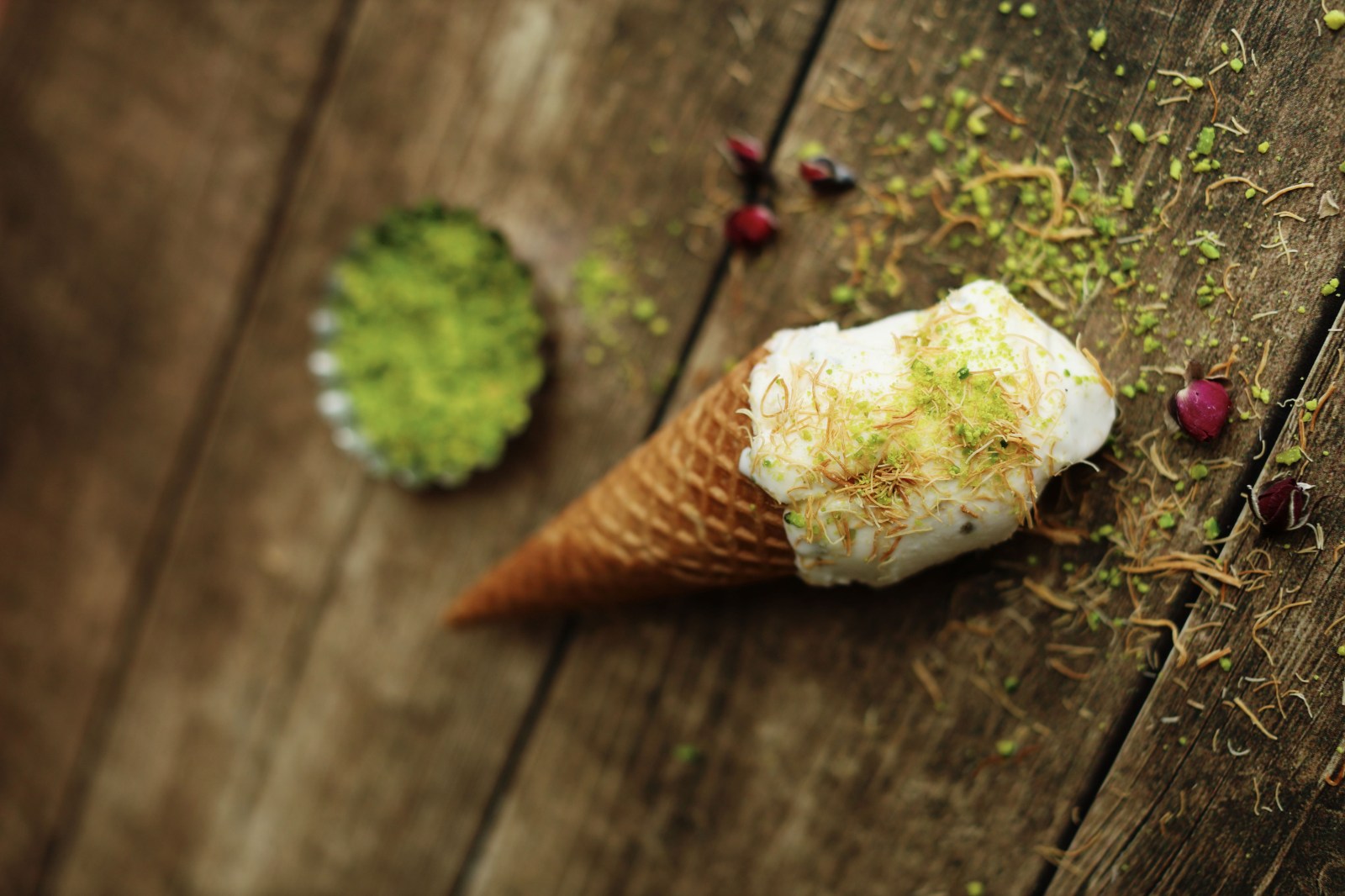
Maverick and Jane’s halaal and authentic gelato would make Italian gelatieri (gelato makers) proud. (Photo: Maverick and Jane).
After six years in the United Arab Emirates‚ chartered accountant Rayhaan Jhetam, decided to “choose adventure” and established Maverick and Jane gourmet popcorn in 2016. Two years later, Jhetam moved on to the next chapter of his adventure: gelato. He travelled to Italy and learnt first-hand from gelatieri (gelato makers) the art of gelato making. “We experimented and found halaal alternatives to prohibited ingredients like porcine gelatine and alcohol-based flavourants,” says Jhetam. The result, he says, was gelato made the authentic Italian way: from scratch using pure, seasonal, wholesome ingredients.
Authenticity and halaal, it seems, can co-exist without compromising one another.
It just makes (business) sense
It’s not just pop-ups and small businesses that have embraced halaal. Most of South Africa’s fast-food franchises have halaal outlets. With South Africa’s halaal economy valued at R45-billion and potentially tripling in the next decade, that’s not surprising.
Wimpy, for instance, currently has 19 halaal restaurants. Marketing manager Cathy Qama says complying with Muslim dietary requirements doesn’t limit the company’s growth and instead provides opportunities for diversification and expansion.
It’s a sentiment shared by Zunaid Ismail, owner/manager of a halaal branch of Calisto’s Portuguese Restaurant at the Cresta shopping centre in Johannesburg. “Being halaal makes our food accessible to everyone,” says Ismail.
Even international brands like EL&N have embraced halaal. Along with its Johannesburg store, all EL&N cafes in the UK, Europe, Asia and the Middle East are halaal. “This ensures that we are able to bring a wider range of guests into our cafés to enjoy the EL&N experience,” says marketing chief Sahar Mahdavian.
South Africa’s halaal food scene is thriving, and it is for everyone. DM
Suraya Dadoo is a freelance writer from Johannesburg. Find her on X: @Suraya_ Dadoo.
Tickets for the HalaalGoods Market can be purchased here.
To find a halaal restaurant near you, visit Hungry for Halaal.






 Become an Insider
Become an Insider
Comments - Please login in order to comment.